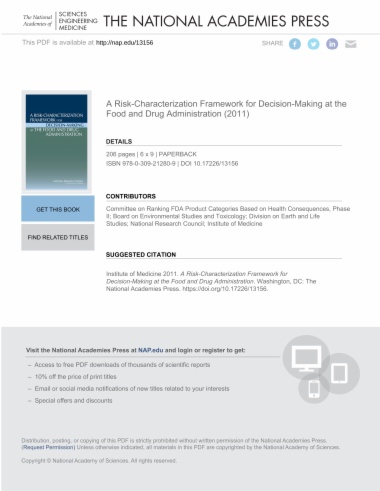

With the responsibility to ensure the safety of food, drugs, and other products, the U.S. Food and Drug Administration (FDA) faces decisions that may have public-health consequences every day. Often the decisions must be made quickly and on the basis of incomplete information. FDA recognized that collecting and evaluating information on the risks posed by the regulated products in a systematic manner would aid in its decision-making process. Consequently, FDA and the Department of Health and Human Services (DHHS) asked the National Research Council (NRC) to develop a conceptual model that could evaluate products or product categories that FDA regulates and provide information on the potential health consequences associated with them.
A Risk-Characterization Framework for Decision-Making at the Food and Drug Administration describes the proposed risk-characterization framework that can be used to evaluate, compare, and communicate the public-health consequences of decisions concerning a wide variety of products. The framework presented in this report is intended to complement other risk-based approaches that are in use and under development at FDA, not replace them. It provides a common language for describing potential public-health consequences of decisions, is designed to have wide applicability among all FDA centers, and draws extensively on the well-vetted risk literature to define the relevant health dimensions for decision-making at the FDA. The report illustrates the use of that framework with several case studies, and provides conclusions and recommendations.